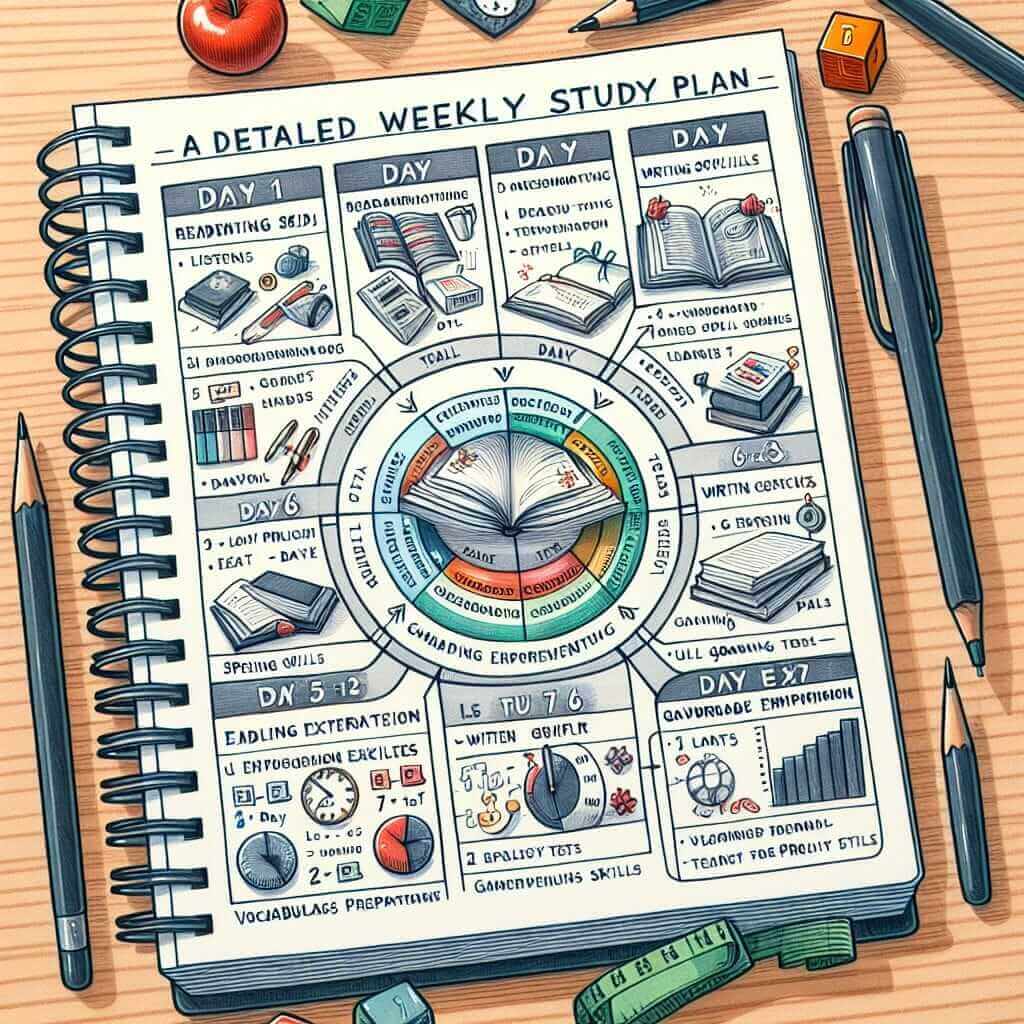The Importance of a Structured IELTS Study Plan
As an IELTS instructor with over 20 years of experience, I’ve witnessed firsthand the transformative power of a well-structured study schedule. Acing the IELTS exam requires more than just English proficiency; it demands strategic planning and consistent effort. A thoughtfully crafted schedule serves as your roadmap to success, ensuring that you cover all sections effectively and approach test day with confidence.
Crafting Your Ideal IELTS Preparation Schedule
1. Assess Your Starting Point
Begin by understanding your current English language proficiency. Take a practice test to identify your strengths and weaknesses across all four sections: Listening, Reading, Writing, and Speaking. This will help you allocate time appropriately.
2. Set Realistic Goals
Determine your target band score and the time frame you have available for preparation. Be realistic! It’s better to aim for steady progress than to overwhelm yourself with an unrealistic schedule.
3. Allocate Dedicated Study Time
Consistency is key. Block out specific times in your day or week solely for IELTS preparation. Treat these slots like important appointments and minimize distractions.
4. Prioritize Weaknesses
Devote more time to the sections where you scored lower on the practice test. If writing is a challenge, for example, allocate additional time for practicing essays and reports.
5. Balance All Four Skills
While it’s crucial to target weaknesses, don’t neglect the other sections. Regularly practice listening, reading, and speaking to maintain a balanced skillset.
6. Incorporate Variety
Avoid monotony! Use diverse study materials like practice books, online resources, IELTS preparation apps, and English-language news sources. This keeps your learning engaging and exposes you to a wider range of vocabulary and grammar structures.
7. Schedule Regular Breaks
Your brain needs time to process information effectively. Incorporate short breaks during study sessions and longer breaks between days to prevent burnout.
8. Review and Adapt
Your study plan should be a living document. Regularly review your progress and make adjustments as needed. Are you meeting your goals? Do certain sections require more attention?

Sample IELTS Study Schedule
Here’s a sample weekly schedule to get you started:
(Assuming 1-2 hours of daily study time)
Monday: Listening practice, Reading comprehension
Tuesday: Writing Task 1 practice, Grammar review
Wednesday: Speaking practice with a partner or tutor
Thursday: Listening practice, Reading comprehension
Friday: Writing Task 2 practice, Vocabulary building
Saturday: Full IELTS practice test
Sunday: Review practice test, Relax and recharge
Tips for Success
- Start early: Give yourself ample time to prepare, ideally 2-3 months or longer depending on your target score and individual needs.
- Practice consistently: Regular, focused practice yields the best results.
- Seek feedback: Have a teacher or tutor evaluate your writing and speaking to identify areas for improvement.
- Stay motivated: Celebrate small victories and remind yourself of your goals.
Conclusion
A well-structured IELTS preparation schedule is an invaluable tool on your path to achieving your desired band score. By assessing your strengths and weaknesses, setting realistic goals, and dedicating consistent effort, you’ll be well-equipped to approach the exam with confidence and attain your language learning aspirations. Good luck!